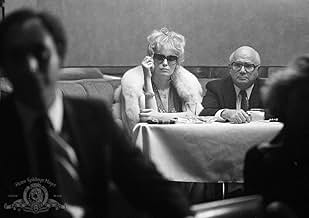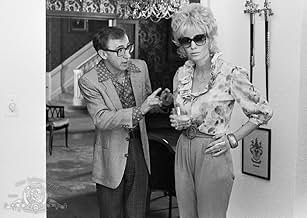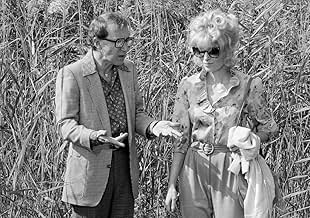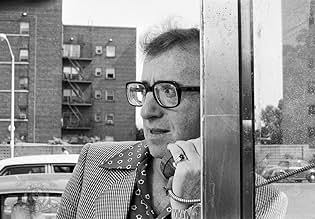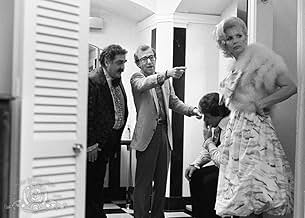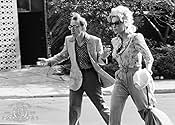En sus intentos por reconciliar a un cantante de salón con su amante, un desventurado agente de talentos es confundido con un amante por un gánster celoso.En sus intentos por reconciliar a un cantante de salón con su amante, un desventurado agente de talentos es confundido con un amante por un gánster celoso.En sus intentos por reconciliar a un cantante de salón con su amante, un desventurado agente de talentos es confundido con un amante por un gánster celoso.
- Dirección
- Guionista
- Elenco
- Nominado a 2 premios Óscar
- 3 premios ganados y 5 nominaciones en total
- Johnny's Mother
- (as Gina DeAngelis)
- Dirección
- Guionista
- Todo el elenco y el equipo
- Producción, taquilla y más en IMDbPro
Argumento
¿Sabías que…?
- TriviaThe reason Mia Farrow wears sunglasses most of the film is that Woody Allen did not feel she could pass herself as a tough Italian "broad", so he had her wear the sunglasses most of the film to hide her eyes, making her seem more sultry and mysterious.
- ErroresIn one scene, Danny can be seen walking past a movie theater, that advertises Operación serpiente (1982) and Halloween III: El imperio de las brujas (1982) on the marquee. However, the film is supposed to take place in the late 1960s.
- Citas
Danny Rose: You know what my philosophy of life is? That it's important to have some laughs, no question about it, but you gotta suffer a little too' because, otherwise you miss the whole point to life. And that's how I feel
Tina Vitale: Know what my philosophy of life is?
Danny Rose: I can imagine.
Tina Vitale: It's over quick, so have a good time. You see want you want, you go for it. Don't pay any attention to anyone else. And do it to the other guy first, because, if you don't, he'll do it to you.
Danny Rose: This is a philosophy of life? This is - it sounds like the screenplay to "Murder Incorporated".
- Créditos curiososThe guys in the Carnegie Deli continue to banter over part of the end credits.
The film begins with a gaggle of older Borscht Belt-caliber comedians sitting around a table at Manhattan's Carnegie Deli, trading stories about Danny Rose. Rose loves acts that are a bit "outside" the mainstream, so there is no shortage of laughs from our storytellers as they remember his one-legged tap dancer, his blind xylophonist, and so on.
After about 10 minutes or so of general reminiscing interspersed with footage of Rose portraying the stories, one man says he's got the Rose story to top them all, which launches us into the "film proper". It's a tale about Rose and his client Lou Canova (Nick Apollo Forte), a Louis Prima-styled singer who had one hit, "Agita", in the 1950s, but who is a has-been when Rose meets him. Broadway Danny Rose is primarily the story of how Rose gets mixed up in a comically deteriorating situation with Canova's mistress, Tina Vitale (Mia Farrow), while trying to ensure that she attends a career-restoring gig, despite the fact that Canova's wife is also going to be there.
Allen treats us to some entertaining postmodernist layering in the beginning. It seems like a normal enough film in the first few moments, but quickly turns into almost a mock documentary as our deli comedians talk about Rose. The Rose material is really all flashback, and even when it "takes over" the film during the Canova story, it still has a mock documentary feel at first. Eventually the Canova story proceeds as any film would, but the bookended storytellers emphasize the nostalgic tone of the film.
Allen is drilling in that fact that we're reminiscing. He wants the audience to reminisce about the tone of the main story, even if they don't have personal memories of the era or that segment of the entertainment industry. For Allen, the film has strong resemblances to some aspects of his personal experience as an up and coming standup comedian, and he even draws parallels such as a Carnegie Deli sandwich being named after Danny Rose in the film--in real life, you can eat a sandwich named after Woody Allen at the Carnegie Deli. Having characters in the film reminisce about what turns out to be a reminiscent mode in a flashback helps audience members outside of the relevant "nostalgia zone" to get into the proper mood.
Interestingly for this goal, even though Allen goes to the trouble to shoot the film in black & white, he doesn't attempt to remove blatantly anachronistic elements--as if he's trying to remind us that this is still artificial reminiscing. For example, a scene that takes place in a Times Square office features a window through which we can see the large flashing "Fuji" sign. On the other hand, Allen also exploits the fact that Broadway Danny Rose was shot just as the recent family-friendly gentrification of the New York City area was taking hold, as there are important scenes on the old, dilapidated West Side docks and in a Jersey City that still looks comparatively like a barren wasteland.
One of the reasons that this film is so charming is that even though Danny Rose is a loser, he's a good-hearted loser with an admirable philosophy of life, despite the fact that he's continually abused and/or given the short shrift by those he helps. Allen is still doing his "neurotic Jew" schtick here, but whereas he tends to draw that character as self-centered in other films, in Broadway Danny Rose he's almost completely altruistic. He actually tries to persuade other characters, who happen to be self-centered, to change their outlooks. He's a Tod Browning to a cadre of performing freaks, promoting and embracing them, even if to most eyes it has to involve exploiting them at the same time. But he admirably can't help seeing the best in everyone, encouraging them and honestly believing that they should be in a "higher position" than they are now. He even does this with the non-performing Tina when she makes some decorating suggestions about his apartment--suddenly, he wants to manage an interior decorating career for her, saying that she should be doing "hotels and embassies".
As is typical for an Allen film, Broadway Danny Rose is filled with amazing, often symbolic cinematography, by frequent collaborator (from 1977's Annie Hall through 1985's The Purple Rose of Cairo) Gordon Willis. It's also full of great performances (including Allen's) and it's infused with Allen's trademark pre-bop jazz, in this case heavily depending on variations of the Prima-like "Agita", somewhat similar to how "In A Persian Market" was used as a theme in the later Curse of the Jade Scorpion (2001).
If you like Allen's typical style, you've surely seen this film. If you're wondering where to start or dip into Allen's works further, Broadway Danny Rose is as good a place to begin as any.
- BrandtSponseller
- 30 abr 2005
- Enlace permanente
Selecciones populares
- How long is Broadway Danny Rose?Con tecnología de Alexa
Detalles
- Fecha de lanzamiento
- País de origen
- Idiomas
- También se conoce como
- Brodvejski Danny Rose
- Locaciones de filmación
- Productoras
- Ver más créditos de la compañía en IMDbPro
Taquilla
- Presupuesto
- USD 8,000,000 (estimado)
- Total en EE. UU. y Canadá
- USD 10,600,497
- Fin de semana de estreno en EE. UU. y Canadá
- USD 953,794
- 29 ene 1984
- Total a nivel mundial
- USD 10,600,497
- Tiempo de ejecución1 hora 24 minutos
- Color
- Mezcla de sonido
- Relación de aspecto
- 1.85 : 1
Contribuir a esta página



